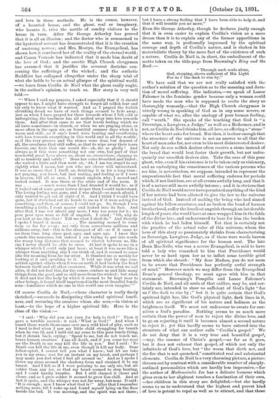BOOKS•
CECILIA. DE NOEL*
Cecilia de Noel is hardly to be called a story, but it is well worthy of the author of Mademoiselle Ixe. The style is admirable ; the figures are all vividly delineated; and though the object appears to be to use a ghost in a haunted house as the occasion for testing the spiritual value of various kinds of religious creeds, no one can charge the authoress with having gone out of her way to drag abstruse questions of technical theology into a popular work. Cecilia de Noel only shows anew how thoroughly popular some of the deeper religious issues may be made, without treating them in any superficial or ad captandum fashion, though we may not be satisfied, and doubt whether the authoress herself is thoroughly satisfied with the religious drift of her very impressive, and in some respects very powerful and pathetic sketch.
Sir George Atherley is a scientific atheist who opens the story with a brief and very effective disquisition on the severity of the scientific creed, on the pitiless precision and accuracy of the methods of the natural energies in which alone he believes, and on the entire absence of any trace of mercy • Cecilia de Noll. By Lamm Falconer, Author of " Mademoiselle Ixe." London : Macmillan and Co.
and love in those methods. He is the owner, however, of a haunted house, and the ghost, real or imaginary, who haunts it, tries the mettle of sundry visitors to the house in turn. After Sir George Atherley has proved that it is all an illusion ; and the doctor who is summoned to the hysterical servant has demonstrated that it is the creation of unstrung nerves ; and Mrs. Mostyn, the Evangelical, has shown how it convinced her of the reality of the eternal world ; and Canon Vernade has indicated that it made him doubt of the love of God ; and the ascetic High Church clergyman has assumed that it justifies the severest doctrine con- cerning the sufferings of the wicked ; and the sthetic Buddhist has collapsed altogether under the sharp trial of what she holds to be an actual glimpse of the spiritual world, —we learn from Cecilia de Noel what the ghost really ought, in the author's opinion, to teach us. Her story is very well told :—
" ' When I said my prayers, I asked especially that if it should appear to me, I might have strength to forget all selfish fear and try only to know what it wanted. And as I prayed the foolish shrinking dread we have of such things seemed to fade away ; just as when I have prayed for those towards whom I felt cold or unforgiving, the hardness has all melted away into love towards them. And after that came to me that lovely feeling which we all have sometimes—in church, or when we are praying alone, or more often in the open air, on beautiful summer days when it is warm and still; as if one's heart were beating and overflowing with love towards everything in this world and in all the worlds ; as if the very grasses and the stones were dear, but dearest of all, the creatures that still suffer, so that to wipe away their tears forever, one feels that one would die—oh, die so gladly ! And always as if this were something not our own, but part of that wonderful great Love above us, about us, everywhere, clasping us all so tenderly and safely ! ' Here her voice trembled and failed ; she waited a little and then went on, 'Ab, I am too stupid to say rightly what I mean, but you who are clever will understand. It was so sweet that I knelt on, drinking it in for a long time ; not praying, you know, but just resting, and feeling as if I were in heaven, till all at once, I cannot explain why, I moved and looked round. It was there at the other end of the room. It was —much worse than I had dreaded it would be ; as if it looked out of some great horror deeper than I could understand. The loving feeling was gone, and I was afraid—so much afraid, I only wanted to get out of sight of it. And I think I would have gone, but it stretched out its hands to me as if it were asking for something, and then, of course, I could not go. So, though I was trembling a little, I went nearer and looked into its face. And after that, I was not afraid any more, I was too sorry for it ; its poor poor eyes were so full of anguish. I cried : " Oh, why do you look at me like that ? Tell me what I shall do." And directly
I spoke I heard it moan The moaning seemed to come from so far far away ; not only from somewhere millions and millions away, but—this is the strangest of all—as if it came to me from time long since past, ages and ages ago. I know this sounds like nonsense, but indeed I am trying to put into words the weary long distance that seemed to stretch between us, like one I never should be able to cross. At last it spoke to me in a whisper which I could only just hear ; at least it was more like a whisper than anything else I can think of, and it seemed to come like the moaning from far far away. It thanked me so meekly for looking at it and speaking to it. It told me that by sins com- mitted against others when it was on earth it had broken the bond between itself and all other creatures. While it was what we call alive, it did not feel this, for the senses confuse us and hide many things from the good, and so still more from the wicked ; but when it died and lost the body by which it seemed to be kept near to other beings, it found itself imprisoned in the most dreadful loneli- ness—loneliness which no one in this world can even imagine.' "
Of course Cecilia de Noel,—whose character is really finely sketched,—succeeds in dissipating this awful spiritual loneli- ness, and restoring the creature whom she sees,—in vision at least,—to the hope of a higher spiritual life. Here is the close of the vision :—.
" I said : 'Why did you not turn for help to God ?' Then it gave a terrible answer : it said, What is God ?' And when I heard these words there came over me a wild kind of pity, such as I used to feel when I saw my little child struggling for breath when he was ill, and I held out my arms to this poor lonely thing, but it shrank back, crying : Speak to me, but do not touch me, brave human creature. I am all death, and if you come too near me the Death in me may kill the life in you.' But I said : No Death can kill the life in me, even though it kill my body. Dear fellow-spirit, I cannot tell you what I know; but let me take you in my arms; rest for an instant on my heart, and perhaps I may make you feel what I feel all around us.' And as I spoke I threw my arms around the shadowy form and strained it to my breast. And I felt as if I were pressing to me only air, but air colder than any ice, so that my heart seemed to stop beating, and I could hardly breathe. But I still clasped it closer and closer, and as I grew colder it seemed to grow less chill. And at last it spoke, and the whisper was not far away, but near. It said : 'It is enough ; now I know what God is !' After that I remember nothing more, till I woke up and found myself lying on the floor beside the bed. It was morning, and the spirit was not there ; but I have a strong feeling that I have been able to help it, and that it will trouble you no more."
Even Sir George Atherley, though he declares justly enough that it is even easier to explain Cecilia's vision as a mere dream than it is to explain any of the former apparitions in the same way, is profoundly impressed by the spiritual courage and depth of Cecilia's nature, and is shaken in his materialistic theory by the mere fact of the existence of such a nature. Cecilia de Noel is, in short, the embodiment of the
motto taken on the title-page from Browning's Ring and flee
Book :— " Through such souls alone, God, stooping, shows sufficient of His Light For us i' the dark to rise by."
We have said that we are not really satisfied with the
author's solution of the question as to the meaning and dura- tion of moral suffering. She indicates,—we speak of Lanoe Falconer in the feminine gender because only a woman could.
have made the man who is supposed to recite the story so- thoroughly womanly,—that the High Church clergyman is utterly wrong in speaking of God as in any sense severe, or capable of what we, after the analogy of poor human feeling,.
call "wrath." She speaks of the teaching that God is "a Sovereign, a Lawgiver, a Judge," as well as a Redeemer, and is not, as Cecilia de Noel thinks him, all love, as offering a " stone " where the heart asks for bread. But then, it is clear enough that the structure of the universe is not an answer to all that the heart of man asks for, nor even to his most disinterested desires.
Not only do our selfish desires often receive a stone instead of the bread that would best foster their growth, but not unfre- quently Our unselfish desires also. Take the case of this poor ghost, who, even if his existence is to be taken only as visionary,
and as embodying the consciences of the various persons who see him, is nevertheless, we suppose, intended to represent the unquestionable fact that moral suffering endures for periods which, if not limitless, are at all events awfully long, and that it
is of a nature still more awfully intense ; and it is obvious that Cecilia de Noel would never have permitted anything of the kind if her nature had been allowed to give the law to the universe instead of God. Instead of making the being who had sinned against his fellow-creatures, and so broken the bond of human brotherhood, suffer the loneliest anguish through an intolerable length of years, she would have at once wrapped him in the folds of the divine love, and endeavoured to bear for him the burden with which he had laden himself. Yet that is certainly not the practice of the actual ruler of this universe, whom the hero of this story so passionately shrinks from characterising as Sovereign, Lawgiver, Judge, as if these were words barren of all spiritual significance for the human soul. The late Dean MacNeile, who was a severe Evangelical, is said to have told a lady who remarked to him that Providence would. never be so hard upon her as to inflict some terrible grief from which she shrank : " My dear Madam, you do not seem to be aware that Providence has perfectly awful strength of mind." However much we may differ from the Evangelical Dean's general theology, we must agree with him in that statement. Browning's Pompilia and Lanoe Falconer's Cecilia de Noel, and all souls of that calibre, may be, and cer- tainly are, intended to show us sufficient of God's light " for us i' the dark to rise by ;" but it is quite certain that God's spiritual light has, like God's physical light, dark lines in it, which are as significant of his nature and holiness as the brightness itself. We must not endeavour to create for our- selves a fool's paradise. Nothing seems to us much more certain than the power of men to reject the divine love, and to go on rejecting it until it becomes almost a second nature to reject it ; yet this hardly seems to have entered into the structure of what our author calls Cecilia's gospel." We do not deny that it is a very true and beautiful gospel,. —nay, the essence of Christ's gospel,—as far as it goes, but it does not exhaust that gospel, of which not only the infinitude of God's love, but " the worm that dieth not, and the fire that is not quenched," constituted real and substantial elements. Cecilia de Noel is a very charming picture, a picture. thrown out by contrast with a considerable number of sharply-
outlined personalities which are hardly less impressive,—for the author of Mademoiselle Ixe has a delicate humour which gives even to her slightest touches a fascination of their own, —her children in this story are delightful,—but she hardly seems to us to understand that the highest and purest kind of love is potent to repel as well as to attract, and that those
whom it repels are only too liable to harden themselves more and more in that attitude of defiance, till it becomes an im- passable gulf, though it may be one made impassable only by their own wills.




































 Previous page
Previous page